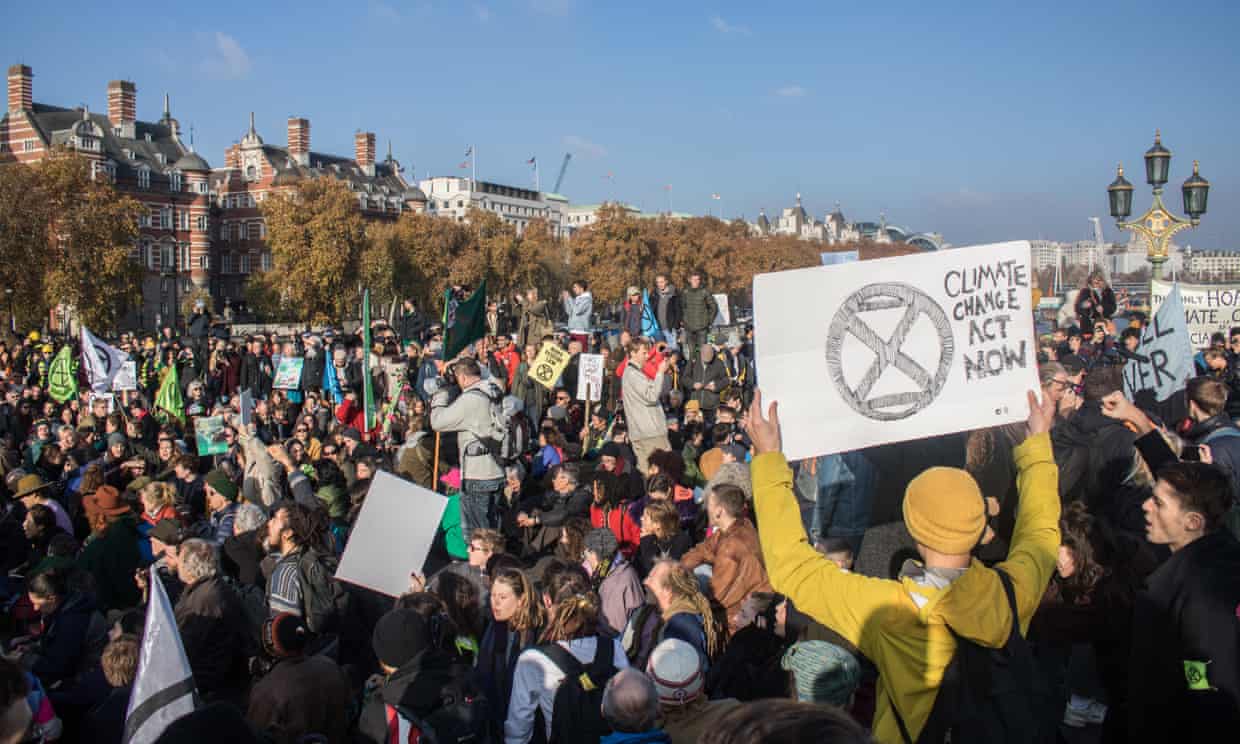|
Extinction Rebellion goes global in run-up to week of international civil disobedience
Jonathan Watts in Katowice, The Guardian

Extinction Rebellion activists at a sit-in on Westminster Bridge in November. Photograph: Amer Ghazzal/Barcroft Images
UK activist group using climate talks in Poland this week to widen 35-country network
Mon 10 Dec 2018 10.29 GMT Last modified on Mon 10 Dec 2018 10.36 GMT
The Extinction Rebellion climate protest group has expanded to 35 countries and is building towards a week of international civil disobedience in April, according to organisers, who are using UN climate talks in Poland this week to widen its network.
The rapid spread of the movement, which consisted of 10 people in the UK six months ago, comes amid rising frustration with policymakers who are failing to slow perilous levels of global warming and biodiversity loss.
The distinctive banner of the group was evident in a rally on Saturday attended by several thousand climate campaigners in Katowice, the city hosting the conference. Campaigners also held Skype workshops for activists in Berlin, after training sessions in the US, Australian, Canada, Ireland, Germany, Spain, Sweden, Ghana and Poland.
“In the two months since our first action, we have expanded more than we imagined”, Liam Geary Baulch, an environmental activist, said. “We are now planning to change our structure so it can accommodate up to 2 million people.”
Extinction Rebellion rose to prominence last month when thousands of activists blocked five London bridges, glued themselves to public buildings and disrupted traffic with “swarming” protests that led to dozens of arrests.
This form of direct action has struck a chord in other countries. The Dutch activist Sjoerd de Koning said he would be among 60 people starting a chapter of the movement in The Hague next week.
Sign up to the Green Light email to get the planet's most important storiesRead more“We saw what was going on in London and thought this is what we have been looking for for a long time – peaceful civil disobedience targeted at politicians,” he said. “There is a lot of energy in this movement and it’s global.”
In Poland, most environmental campaigns until now have been locally focused on issues such as smog in Silesia, deforestation in Bialowieza and wetland destruction in Rospuda, but activists are starting to sign up to Extinction Rebellion, which some see as a potential umbrella organisation.
“We can all unite under this and make our voice heard,” said Izabella Mier, a member of a food sovereignty group. “It’s incredibly inspiring to bring different organisations together for a common goal. We’re looking for a way not just to be worried about climate change but to do something.”
The Warsaw chapter held its first meeting two weeks ago, when about 50 people watched a video about the bridge blocking actions.
Wiktor Kotowski, a wetland scientist at the University of Warsaw, signed up online and then printed his own Extinction Rebellion T-shirt, which he wore while speaking at a side events during the climate talks.
“After I heard the Polish president open the conference with a bullshit claim that we can protect the climate by burning coal, I thought I had to do something,” he said. “This is a moment when scientists should get more active in society. I’ve been thinking this for a couple of years.”
The movement has received mixed levels of support from other international climate campaign groups. The US-based 350.org – which has organised direct action protests against gas and oil pipelines – has been an enthusiastic backer, while Greenpeace has so far offered help only behind the scenes.
Extinction Rebellion organisers say it will be necessary for chapters in each country to adapt tactics according to the local political situations.
The challenge was highlighted in Poland by the government’s initial refusal to allow entry into the country by 350.org campaigners, reportedly on the grounds that they were a “threat to national security.”
Unlike anti-World Trade Organization protesters, black-bloc anarchist groups or gilets jaunes demonstrations against austerity and fuel tax rises in France, environmental campaigners say their actions have focussed on non-violent civil disobedience.
On Sunday, 100 academics and other prominent backers of Extinction Rebellion called for people around the world to rise up and organise against the “paralysis” of political leaders.
“We must collectively do whatever’s necessary non-violently, to persuade politicians and business leaders to relinquish their complacency and denial,” the open letter stated, which was signed by Noam Chomsky, Naomi Klein, Bill McKibben and Rowan Williams, the former archbishop of Canterbury, among others.
|
Jonathan Watts, The Guardian, 10/12/2018
|
|
|
|
The Mary Initiative
A Bridge of Understanding
Operational, Safety, Security & First Aid Training for NGO's
|
|
|
|